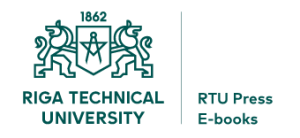Gāzveida kurināmā degšanas kontroles metodoloģija intensīvajā elektrostatiskajā laukā
Summary of the Doctoral Thesis
Otto Krickis, Riga Technical University, Latvia
![]() https://orcid.org/0000-0003-0415-6216
https://orcid.org/0000-0003-0415-6216
The Doctoral Thesis “Combustion Control Methodology for Gaseous Fuels in Intense Electrostatic Field” is devoted to control of the combustion process of gaseous fuel and flue gas emission in application of intense electrostatic field, as well as to the research of the flame thermo-acoustic effect. The focus of the promotion work is on the need to develop technical methods to reduce both the costs of maintenance of combustion plants and greenhouse gas emissions in the atmosphere, as well as to increase the efficiency of energy consumable technologies. The goal of the Thesis is the development of a methodology for the control of combustion and harmful emissions formation of premixed gaseous fuels in an intensive electrostatic field. It provides the development of a set of techniques and methods, which allow to prove an impact of intensive electrostatic fields on geometrical shape of flame and on emissions such as CO, NOx and CO2, as well as ensure the control of flue gas temperatures and better combustion of fuel and primary energy savings. The Doctoral Thesis consists of an introduction, theoretical and analytical part, and methodology – description of the equipment used in the research and its technical characteristics, as well as experimental design and data processing methods. The first chapter (theoretical and analytical assessment of fuel combustion in external field conditions) describes the effect of the use of electrostatic, magnetic and electromagnetic fields on the combustion of fuel, covering a detailed ionization process and ion flow theory. The second chapter (methodology for a gaseous fuel combustion research under electrostatic field conditions) provides indicators for the main components of the equipment used, a description of their design, and the development and adjustment process. An expansion of the research methodology and experiment design, the methods used and the procedures for collecting data and data processing algorithms are provided, as well as facts about the used data processing programs. The third chapter (results of a gaseous fuel combustion research under electrostatic field conditions) includes results of the single-factor and multivariate experiments using both DC and pulsating current sources. The effects of an intense electrostatic field impact on the concentrations of emissions, changes in flame geometric shape and flue gas temperature were analysed, and the effects of the electrostatic field impact on the thermal-acoustic effect of the flame were evaluated analytically. This chapter summarizes graphic results and empirical regression equations of the observed correlations. The fourth chapter (techno-economic assessment of the use of an intensive electrostatic field) analyses the technical-economic assessment of the results of research. The developed methods in the framework of this research make it possible to reduce the costs of maintenance repairs of heavy-power combustion plants installed in Latvia. Including the costs of technological integration, savings of up to EUR 550 000 over a fifteen-year period can be achieved, in addition ensuring the reduction of greenhouse gas emissions and the savings of primary energy sources.
Additional information
| DOI | |
|---|---|
| Publication type | |
| Hyperlink | |
| Defence date | 17.05.2019. |
| ISBN (print) | 978-9934-22-280-1 |
| ISBN (pdf) | 978-9934-22-281-8 |
| Format | |
| Pages | 31 |
| Published online | |
| Publisher | RTU Press |
| Country of Publication | Latvia |
| Publication language |
You must be logged in to post a review.




Reviews
There are no reviews yet.